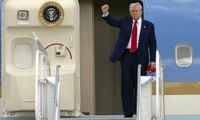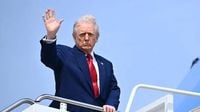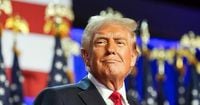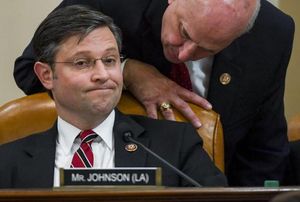In a surprising twist in U.S. trade policy, President Donald Trump announced his willingness to negotiate tariffs with countries if they present something "extraordinary" in return. This declaration, made aboard Air Force One, stands in stark contrast to earlier statements from his senior advisors, raising questions about the administration's true trade strategy.
Just hours before Trump's comments, top trade advisor Peter Navarro and Commerce Secretary Howard Lutnick insisted that the new tariffs were not up for negotiation. "This is not a negotiation," Navarro emphasized during a CNBC interview. "This is a national emergency." The conflicting messages from Trump and his advisors have left analysts and investors puzzled about the direction of U.S. trade policy.
The backdrop to this confusion is a significant downturn in the stock market, which saw approximately $2.5 trillion wiped off the S&P 500, with the index plummeting nearly 5%. The Russell 2000 index, which tracks smaller companies, has also suffered, experiencing a 20% decline from its record high. The U.S. dollar has depreciated by 1.5% amid fears of a trade war escalating.
On April 3, 2025, Trump stated, "Every country is calling me. That's the beauty of what we do. We are in the position to control the situation." This statement came just a day after he unveiled a reciprocal tariff measure affecting over 180 trading partners globally. Under this decree, about half of the economies will face a common tax of 10%, effective from April 5, while major trading partners could see rates as high as 50% starting April 9.
When pressed about whether he would consider negotiations to reduce the tariffs, Trump replied, "It depends. Taxes will only be reduced if they give us something good." This phrase, “something good,” remains vague, leaving many to speculate on what concessions Trump might seek in exchange for lowering tariffs.
The announcement of these tariffs has already triggered significant sell-offs on Wall Street, with fears that retaliatory measures from other nations could further destabilize the global economy. The White House's earlier communications suggested that the tariffs should not be viewed as preliminary steps toward negotiations, yet Trump's latest remarks indicate a willingness to engage with individual countries.
Scott Bessent, the Treasury Secretary, has been more optimistic, suggesting that some tariffs could be avoided through successful negotiations. Earlier this month, he stated, "If you reduce this tax to 0, we will do the same." His comments reflect a belief that diplomatic discussions could mitigate the impact of the tariffs.
Market analysts are concerned that unless Trump eases his tariff stance, the markets could face further declines. Ed Yardeni, president of Yardeni Research, expressed hope that the reciprocal tariffs would be negotiated down to avoid a trade war reminiscent of the 1930s. "We hope the art of negotiation remains a driving force for the President," he noted.
As the situation unfolds, the international community watches closely, preparing for potential retaliatory actions against U.S. tariffs. Many countries are bracing for the possibility of a trade conflict that could reverberate through global markets.
The unpredictability of Trump’s trade policy has resulted in a precarious environment for investors and businesses alike. With the stock market already reeling, any further escalation in tariffs could exacerbate fears of a recession in the U.S. economy.
In summary, Trump's recent remarks about negotiating tariffs introduce a level of uncertainty that contrasts sharply with his administration’s previous firm stance. As he navigates the complexities of international trade relations, the implications of his decisions will be felt far beyond U.S. borders, affecting economies around the globe.






